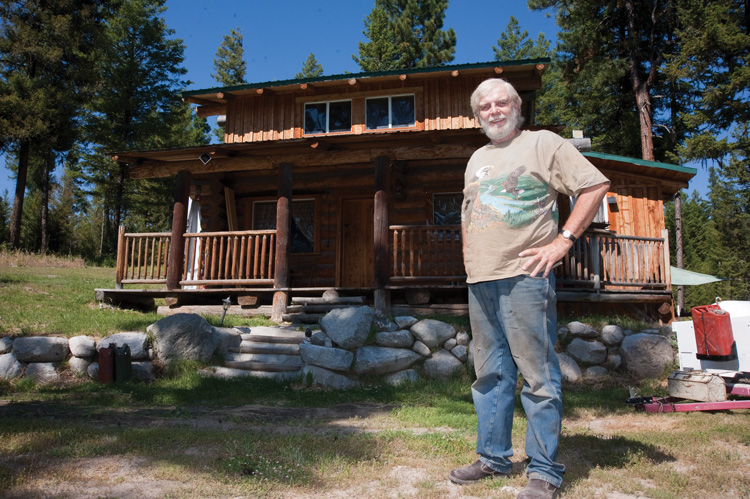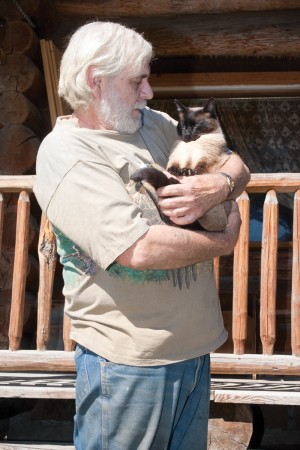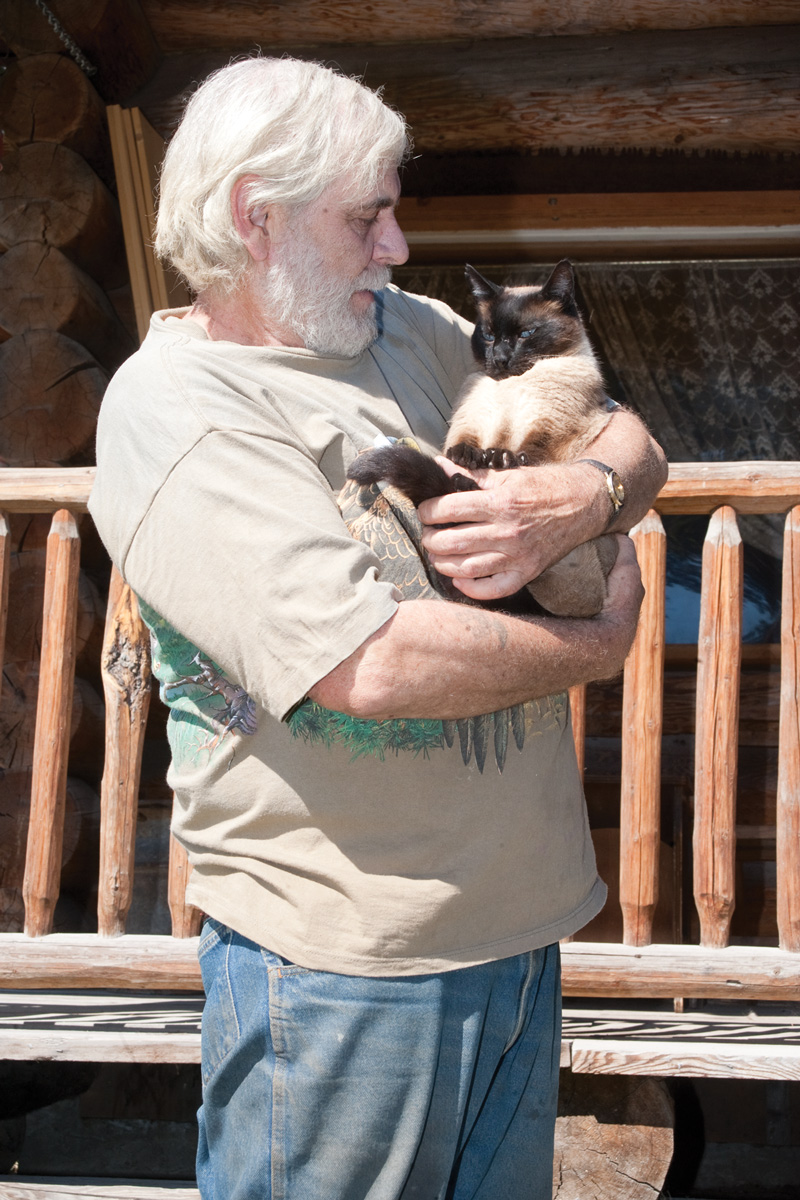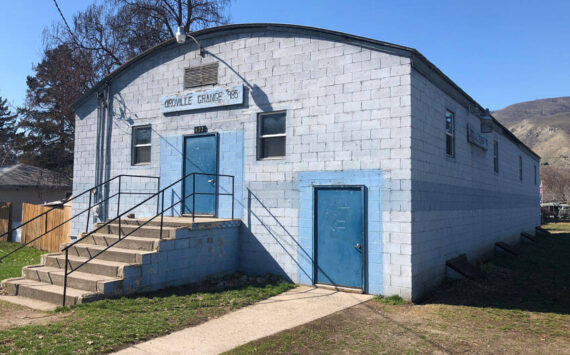

Ken Fulford faces PTSD, life issues with humor, ingenuity
TONASKET – The outcast military veteran living alone in the mountains is almost as much a part of Pacific Northwest folklore as the Sasquatch.
But in Okanogan County, the off-the-grid veteran is quite real.
Some live in isolation by choice. Others find withdrawal from society the only way to carve out a life in a world that only now seems to be learning how to accept and cope with the damage Viet Nam wrought on those who physically survived the conflict.
The living hell that was Nam came home with many who served there, and Ken Fulford was no exception.
“Yeah, I’m a Viet Nam veteran,” Fulford said. “I have issues and I’ve had issues.
“I filed (with the VA) in ’84 and wasn’t allowed my retirement until 2003. It’s just the way the VA works. I was honorably discharged Feb. 2, 1980. I spent six years as a US Navy Reserve.
“I filed knowing I was having some problems. For one thing I liked to stay drunk all the time. And I had nightmares a lot. My lady friend and I were fighting all the time. Money became an issue. All of the normal things of life became hurdles.”
Fulford now lives in a self-built solar-powered log cabin on Mt. Hull, in the center of what can be a “wild west” environment. He not only knows the Okanogan Sheriff’s deputies by name, he likewise can identify the voices of each of the county dispatchers. He even willed his property to the Sheriff’s department a few years ago.
His only connection to the “grid,” as it were, is a phone line. Hard-wired, not cell.
“I always told everyone that asked, we didn’t win the war but we haven’t stopped fighting it,” Fulford said. “We brought it home with us. That anxiety attack that started when I was 20? It hasn’t stopped yet.
“There was a time when I would get so angry I’d start shaking. A lot of guys figured I had Parkinson’s. No, I have PTSD (post traumatic stress syndrome). I was just pissed off enough to want to choke you to death.”
Nam
Fulford served in the U.S. Navy as an F-4 mechanic in VF-213 Black Lion Squadron on the U.S.S. Kitty Hawk (CV-63). In 1974-75, that meant taking part in the evacuation of U.S. forces that led to the fall of Saigon.
“It was Nixon that said we were going to stop shooting,” Fulford said. “Thing was we didn’t get Charlie (the Viet Cong) to promise to stop shooting. Obstinate little bastards.”
U.S. forces evacuated not only their own, but tens of thousands of South Vietnamese refugees as Saigon was overrun.
“They was coming down through the whole length of the coast, overrunning little bergs here and there like Dien Bien Phu,” he said. “We were pulling first Marine Recon, Big Red One, and Ranger units and Special Forces and SEALs as fast as we could to get them out of the way. So when we did have to open up and create an ‘incident’ they wouldn’t be there to be in the way.”
Once enemy forces reached Saigon, chaos ensued.
“Charlie decided it was easier to go through the international airport that we couldn’t shoot at that to get to our embassy three blocks away,” Fulford said. “So instead of going through the gates of Saigon, he come through the gates of the airport where we couldn’t shoot at him.
“If you ever watched the TV pictures of it, it was a bloody mess. We pushed helicopters overboard, tried to make room in every hole for people. We put them everywhere we could, got them blankets, shoes and clothes.”
Even while still in the Navy, Fulford’s temper could get the best of him, one time earning him a demotion.
“I smacked my chief petty officer after I caught him in bed with my first wife,” he said. “He’s lucky I didn’t kill him. I got 30 days in the brig, he got two weeks R&R in Hawaii.
“I split his lip; I’m surprised they didn’t give him a Purple Heart.”
Coming home
Nam doesn’t leave a man; Fulford struggled after his discharge.
“I went and filed with the VA, tried to get Social Security to kick in and they denied me three times,” he said. “It got worse. I had some issues by ’87 that got me four months in jail. Lost my so-called family and all of that. My sister, brother in law, nephews, dad and mom.
“They started having this idea that I was someone they didn’t want to have around.”
Fulford eventually settled in with a job at Osterman Fisheries in Anacortes.
“I had done four years apprenticeship since I’d got into trouble, and 12 years to get to where I had my own crew and worked for three different companies,” he said.
But in 1997, he said, he was diagnosed with cancer. He worked until 1999 – “Until I couldn’t stand up,” he said – when was asked to take a month off.
“I was sicker than a dog,” he said. “My dad said, ‘Well, if you’re going to die, come home.’ He said he couldn’t afford to come and get me.”
A Tonasket native, he’d bought the property he now lives on seven years earlier, but it hadn’t yet been cleared. He took up residence down by the river in a 20-foot trailer he owned.
“I thought I could move up here, God willing, cut firewood, create a life and do the right thing for myself,” Fulford said. “I moved everything – cars, trucks, projects – over from the coast. I don’t know what I thought I was doing. I was just constantly busy. I think I was just so afraid of the cancer that I just worked as hard as I could to keep from thinking about it. Just an insecure kid, really, like I was when I was overseas.”
The self-medicating with alcohol and marijuana wasn’t helping, but poverty helped start the drying-out process.
“I didn’t really stop the drinking but by the time I got here I didn’t have the money to continue,” Fulford said. “Every once in a while a neighbor would get me a beer or a pint. Or bring me a bag. Then I found out it wasn’t just marijuana you were getting. It was laced with all sorts of stuff.”
An unusual will
Fulford said his relationship with the Sheriff’s department began shortly after he moved onto the property in about 2001, when he says someone poisoned his dog.
“With those kinds of issues, I needed help,” he said. “I had a lot going on. I met (Sheriff) Frank Rogers through Bertha Wandler.
“We had a nice long talk. I promised Frank I would get clean as far as my medications at the time – I was self-medicating. I had nobody else. I tried to get family to come and help, tried to get somebody else here with me.
“I have no family. I couldn’t get anyone in my family to pay attention or care.”
His familiarity with the Sheriff and deputies has ruffled some feathers, to say the least.
“I’ve got neighbors that would really like to poke a bullet through me,” Fulford said. “I’ve had four busted out of here. I’ve pushed some issues with others. When you’re talking meth labs, grow ops, hot rod motorcycles, bandito-types, you’re putting your life on the line.
“I had to talk it over with Frank… I had to figure out a way to make this balance out in the long run.”
He hopes the department will allow one of its deputies to live in Fulford’s residence once he’s gone.
“A young officer coming to work needs a place that doesn’t cost much,” he said. “This county doesn’t pay nothing. To give the county a place to put him and his family is probably more important than anything they can do on their own.
“I know one who would really like to be here. Our poor officers, they can’t even get their own damn bullets.”
Building a home
Fulford won his retirement compensation in 2003, but it came with strings attached: because of his background, he wasn’t allowed to manage his own money. He reached out to Bertha and Herb Wandler of Tonasket, whom he’d known for some time. After passing a background check, Bertha handled his finances, and Fulford set about building his home.
“It took two years to get the logs,” Fulford said. “It was amazing the amount of agony we went through to get that to happen by ’05. We had the roof on it by that fall, primarily Larry Brown and I working at it, driving the nails and screws.”
That was after pouring the foundation more than a year earlier. Struggles with the log home builder he’d hired protracted the process.
“I was amazed a log home builder couldn’t build a log home, and it went downhill from there,” Fulford said. “I insulted him, because he was being insulting to us.
“It’s like a boat – like a hole in the water you keep throwing money into. I realize, it’s livable and I’ve been living here since the fall of ’05, but I lived down in my shop for a year. It took thousands of dollars, and every time I would have to go to Bertha and ask for money to get things done. Insulation, roofing, you name it.”
One thing he decided not to pay for was electricity after being told it would cost $2,500 to get it to his house from the road.
“I was probably looking at $5,000 with permits and all,” Fulford said. “And I know me pretty well. I would have to go buy a TV, a better stereo, get me a mixer and can opener and all the goodies. Then I’m getting a bill every month, for the pleasure of spending my money on all these other attachments.


“The way its laid out is excellent for solar power. I can go a week before I have to fire up a generator, thought in the winter it’s harder.”
Eventually Fulford was allowed access to his own money.
“Within two years I was on my own feet and proved to the state that I was capable,” he said. “Bertha gave me a springboard and gave me a chance to step out there. Then getting to know the guys on the Sheriff’s department, that probably kept me out of prison. I was getting pretty hot about the antics up here.”
Near-death experiences
A couple of incidents changed Fulford’s outlook on life and, ultimately, his direction. At about the time his log cabin was finally going up, Fulford went down.
“I was pretty badly poisoned,” he said. “I can’t say their names but I can point to the evidence of them poisoning my cat, me, putting stuff in my water. I had to pour everything out that I had because I was afraid of it.”
Fulford went to the sheriff, both asking for and offering help.
“He convinced me that in order for me to have anything worth saying that he can bank on that I can help him with, I had to be clean,” Fulford said.
It also led to a trip to the hospital, where tests revealed both that his cancer was in remission, and proved he was drug-free.
“My white blood cells were coming back,” he said. “I had complete blood work done at the VA, and I had that sent to Frank because it showed I was clean, and I was in remission.
“The doctor thought it was the fresh air, clean living, eating better foods, putting my home together. It gave me more than I was getting in society. I’ve been clean ever since, but I grew a ponytail.”
Fulford doesn’t have a ponytail at the moment.
“I had to cut it off,” he said. “It was ruining my life. It was being a problem.”
Three years later, Fulford was trying to install a cap on his chimney.
“I fell off the roof,” he said. “From the top. The ladder decided we needed to go back down to the ground level…
“I don’t know how long I laid there but I realized I’d better get up. Something was saying, you’d better get your butt up. Or you’re not ever getting up.”
Unfortunately, he’d left his phone upstairs on a windowsill. So, he said, despite four fractures in his back, he had to climb back up the ladder to get the phone so he could call for help. And then it took three hours for an ambulance to find him in the labyrinth of dirt roads, unmarked driveways and threatening signs characteristic of Mt. Hull.
“It was six weeks before I could start working on the house again,” Fulford said.
That was, in part, what got him thinking about passing his property on to the Sheriff’s office.
“To fall off a roof and there’s nobody around except Tai Chi, you don’t realize the power that has,” he said. “Now I can call Dispatch and everybody knows me.”
Talking to the animals
Living alone on the mountain, with some neighbors friendly, others not so nice, and all craving their privacy, Fulford has poured his love into animals. His constant companion, Tai Chi, a Siamese cat, knows he’s Fulford’s roommate, nothing less.
“He’s got a personality that won’t quit and he’ll let you know,” he says. “He wakes me up every morning. Hardly ever uses his box, but when he does he’s desperate. Lets me know when he needs to go out; he’s worse than a dog.
“But he’s been a blessing. Without him I’d have gone way off the deep end a long time ago. Now I’m just off the end of the pier a little bit.”
He also usually has at least one dog on hand. And there are a plethora of deer and other wildlife that make the area home, so Fulford has made it is mission to look out for them.
About 12 years ago, he was awakened one night by the sound of something he thought was yelling “Mama!”
“I put up with it a couple nights,” Fulford said. “I called (WDFW officer) Troy McCormick. I told him I thought I had a bear cub out there missing his mommy. He told me they’d killed a 500 pounder across the line from me up here. Maybe they just didn’t get the kid.”
One of his neighbors started feeding the cub pablum. At the time, Fulford was living on $30 a week, but that didn’t stop him from feeding the bear.
“I made peanut butter sandwiches, stew, anything to get him to shut up at night,” he said. “I’d go out and put it on the stump, and I’d turn around and he’d be there. He was spoiled.
“We got him through the first winter. Buckshot (Fulford’s dog) was really glad when I got him to go to bed (hibernate), one sandwich at a time down to his mama’s den. Then he was home and he calmed down. When he came out in the spring he was huge, as big as me.”
BB disappeared for several years, but made an unexpected return.
“In ’09 BB came into the yard and he was huge. He came right up on the porch,” Fulford said. “Bear just thought he’d come out and check out Missy, (a dog) that I hadn’t had when BB had been around. I stepped out the door, had the pistol in my belt. He stood up and he was so big you couldn’t see out the door. I thought, I’m way too close. And he looked at me the same way.
“He rared back and I didn’t know what to do. I didn’t want to talk ’cause he could knock my head to Republic. So I yelled, ‘What the hell do you think you’re doing? You don’t come up on the porch!’ He literally motioned – stands up, motions toward the dog, like he’s asking who the new guy is. I go, ‘Get the hell off the porch!’
“He turns around and walks off, grumbling, like a kid in trouble.”
Fulford said that BB eventually got into the grease running a neighbor’s biofuel plant and was removed from the area.
“I think they took him over to Starvation Ridge and let Seattle kill him,” Fulford said. “So, BB is dead.”
Despite the difficulty of losing some of his companions, he said having them around has definite benefits.
“None of the animals seem to notice that I don’t have power,” Fulford said. “Even Tai Chi doesn’t complain.”
Legacy
Fulford often thinks of what Tonasket and Okanogan County were like when he was young, and said he is trying to leave a positive legacy despite the struggles both external and within.
“When I was a kid we went to church – the Lutheran Church, the Brethren Church, the Free Methodist Church,” he said. “My dad always said if you needed help you go to the Rampleys, or Herb Yarnell. Ray Attwood. Ed Buchert. I had family. I was so proud.
“I have flashbacks from the days when I was a happy camper. I thought it was best that I tried to remedy the problems that the county has incurred. I wanted to make sure I left a legacy in the place I was born.
“I have put a lot of time and effort into this, trying to make it nice. All them guys (county officers) are welcome here and I make it known. Some of them are pretty good friends. Some of them are a little standoffish, a little worried about me.”
He paused, then laughed.
“I would be, too, if I didn’t know me as well as I do.”




